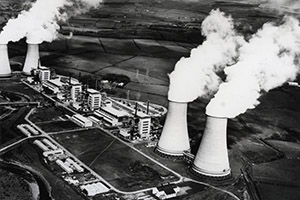
History-Periods
Past eras

From pre-history to today
Choose your period

Periods of History
explore the different eras

The British nuclear weapons program, codenamed "Tube Alloys," was initiated during World War II and involved collaboration with the United States and Canada through the Manhattan Project. However, after the war, the United States passed the McMahon Act, which restricted access to nuclear technology and materials, and prevented the sharing of information with other countries, including the UK.
As a result, Britain had to develop its own nuclear program and began building its first atomic bomb in the early 1950s. The first successful British nuclear test, codenamed "Operation Hurricane," was conducted in the Monte Bello Islands in Australia in 1952.
There were several reasons why the UK felt it needed the atomic bomb:
Deterrence: After World War II, the UK faced a new threat from the Soviet Union, which was rapidly expanding its military power and influence in Europe. The UK saw the development of nuclear weapons as a way to deter the Soviet Union from attacking the UK or its allies.
National Security: The UK believed that possessing nuclear weapons was necessary for its national security and for maintaining its status as a major world power. The UK saw the atomic bomb as a symbol of its technological and military prowess and as a means of maintaining its position in the world.
Pressure from Allies: The UK's nuclear program was initially started in collaboration with the United States and Canada, through the Manhattan Project. The UK felt pressure from its allies to develop its own nuclear weapons to contribute to the collective defense of the Western world against the perceived threat of the Soviet Union.
Political Influence: The UK saw the development of nuclear weapons as a way to increase its political influence on the global stage. Possessing nuclear weapons gave the UK a seat at the table in international discussions about nuclear disarmament and non-proliferation.
The UK developed several programs and capabilities in conjunction with the atomic bomb:
Nuclear Weapons Program: The UK developed a nuclear weapons program, which included the development of nuclear bombs and the infrastructure to support them, such as testing facilities and delivery systems.
Nuclear Power Program: The UK also developed a civilian nuclear power program, which included the construction of nuclear power plants to generate electricity.
Nuclear Research: The UK conducted extensive research in nuclear physics and related fields, which helped to advance the understanding of nuclear technology and its potential applications.
Defense Infrastructure: The UK developed a complex defense infrastructure to support its nuclear weapons program, including missile tracking stations, early warning systems, and secure command and control centers.
Civil Defense: The UK also developed civil defense measures to protect its citizens in the event of a nuclear attack, including fallout shelters and evacuation plans.
Diplomacy: The UK played an active role in international diplomacy related to nuclear weapons, including negotiations for arms control and disarmament agreements, such as the Nuclear Non-Proliferation Treaty.
Overall, the development of the atomic bomb spurred a range of scientific, technological, and defense-related advancements in the UK, which had significant implications for national security, energy policy, and international relations.
The international reaction to the UK joining the nuclear club was mixed. Some countries, particularly the United States, welcomed the UK's entry into the nuclear club, seeing it as a way to bolster the Western world's nuclear deterrent against the Soviet Union. The US also saw the UK's possession of nuclear weapons as a way to share the burden of maintaining global security.
However, many other countries, particularly those in the developing world, were strongly opposed to the UK's nuclear program. They saw the possession of nuclear weapons as a violation of international law and a threat to global peace and security. The UK's nuclear program also sparked concerns about a nuclear arms race, as other countries sought to develop their own nuclear weapons in response.
The UK's nuclear program also led to calls for nuclear disarmament and non-proliferation. Some countries, particularly those without nuclear weapons, called for the UK to abandon its nuclear program and for all nuclear-armed states to disarm. These calls ultimately led to the signing of the Nuclear Non-Proliferation Treaty in 1968, which aimed to prevent the spread of nuclear weapons and promote disarmament.
Overall, the UK's entry into the nuclear club was controversial and had significant implications for global security and international relations.
If you have a suggestion regarding additional topics you would like to see included - please let us know
Reference: Article by Greg Scott (Staff Historian), 2024
Tour Reviews
History Attractions
Submit Tour Suggestions
2024 Departures
Spotlight Tours
Events and anniversaries

All content and images are protected by copyright to Access History